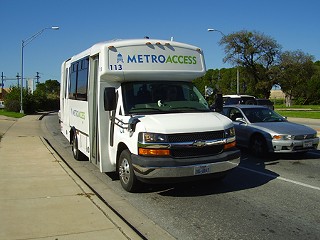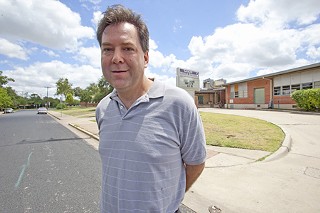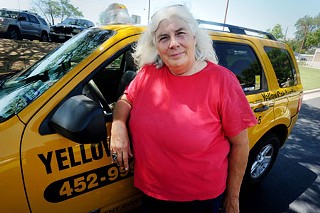Access Denied
Cap Metro saving money means hardship for neediest riders
By Lee Nichols, Fri., July 8, 2011

Life has never been easy for Marie and Bill Chandler. But it used to be easier.
Both are blind. Both are elderly. And for the past 48 years, they have cared for their daughter, Debbie, who suffers from profound mental retardation, autism, and blindness. Debbie lives at the Austin State Supported Living Center in West Austin. For many years now, the highlight of her week has been getting to check out every Friday and visit Mom and Dad at their Allandale home.
The trips used to be fairly uncomplicated. Because the Chandlers are qualified for Capital Metro's MetroAccess paratransit services, they could call a cab – usually driven by Yellow Cab driver Hannah Riddering – and Cap Metro would give them a voucher to cover the first six miles of the trip, up to $16.50. This enabled the Chandlers to pick up Debbie in the morning and take her back in the evening.
But as of May 1, those vouchers ceased to exist. And according to Marie Chandler, that has made the trip an impossible ordeal.
In order to save money and presumably make paratransit service more efficient, Cap Metro eliminated the vouchers and is encouraging its disabled customers to move to the regular MetroAccess vehicles – those vans and sedans you've perhaps seen driving around town. Because those vehicles are shared with other customers, they come with a set of rules to help coordinate trips for multiple riders.
For the Chandlers, the change has put Debbie's weekly visit in peril. One of those MetroAccess rules is that, once dropped off – in this case, the Chandlers arriving at the living center to pick up Debbie – a customer must wait one hour before the next scheduled pickup. It might not seem like much, but it's a big change from Debbie's previous routine – and one that can cause some dangerous behavior.
"The autism makes it very difficult for her to undergo any changes," Marie says. "Debbie is not a passive little person. When I go to pick her up, she's never really content while I'm checking her out. She's never really sure that she's going to get to come home until we get in the car; then she relaxes. But having to wait for an hour or longer – Debbie couldn't handle that. Quite honestly, if she's really having a severe behavior, I cannot handle her. I don't have the strength to restrain her to keep her from hurting herself."
To pay regular cab rates for the four total trips on those Fridays, Marie calculates, would cost $63 – more than they can afford. But taking the regular MetroAccess vehicle simply isn't an option. So for now, Riddering simply provides the trip free of charge, but Marie knows that arrangement can't always be available.
The Chandlers are not alone. According to many others with disabilities in Austin, this change has turned countless lives upside down. People with disabilities used to be able to travel about relatively freely; their days are now consumed with planning and scheduling.
The changes, responds Cap Metro, were urgently necessary; spending on the program was out of control and getting worse. It was just one problem among many at the agency – over the past seven years or so, excessive spending combined with the economic downturn put the agency in financial peril, and Cap Metro's board and management (including relatively new President/CEO Linda Watson) have taken major actions to correct its monetary course. The agency describes the changes as getting its house in order. But those affected say Cap Metro is punishing some of its most needy customers for its own past mistakes.
Marking Time
Most of the disabled Austinites interviewed for this story were brought to the Chronicle's attention by Riddering. To be fair, Riddering is hardly a disinterested observer. She says that before the elimination of vouchers, about 90% of her work was picking up the disabled – the voucher elimination has "devastated my business," she says.
Nonetheless, she took on this work voluntarily and advocates for her customers' needs – some cab drivers are unwilling and/or untrained in helping people with disabilities with their special needs. In 2008, Riddering was named Best Cabbie With a Cause in the Chronicle's "Best of Austin" Critics Picks. Shortly before this story was written, she was helping one of her former regular customers move to Michigan – the customer, who is blind, said the move was necessary because Cap Metro's new policies had made life too hard.
"People could request a voucher to come home from the grocery store or the doctor," Riddering says. "And in the case of people who were having trouble getting to work on time, they put a lot of people on taxi vouchers." Customers could either request trips on demand, or for regularly scheduled trips, subscriptions were available. "What that did is, you got home without spoiled groceries. You could just call for a cab when you were done at the doctor. You could be flexible in your work schedule in terms of getting there on time, working overtime if your boss required it."
Now that flexibility is gone. In addition to the one-hour wait between trips, another new policy has expanded the allowable pickup window from 15 minutes to 30 minutes – meaning, for example, if you request a pickup time of noon, you must be ready to board the vehicle no later than 11:45am and be prepared to wait as late as 12:15pm. If you absolutely cannot be late in your arrival, then you must schedule a pickup a full hour before that arrival time.
The policy change is especially problematic for people with kids – and in the case of Ed Kunz, it's required a major life shift. Kunz, 62, is the director of the Criss Cole Rehabilitation Center, the facility on Lamar Boulevard for people with visual impairments. Kunz isn't ready to retire yet, but because of the voucher elimination, he says he'll do just that.
Kunz himself is blind. His wife also has vision problems, as well as multiple medical issues requiring frequent doctor visits. On top of that, he has four adopted kids, all of whom also have disabilities. "What the taxi voucher allowed me to do was have the flexibility to drop kids off at school, go to work, and make adjustments in my schedule as needed," Kunz says. "Sometimes the kids were pulled out of school or had to go to the doctor, or my wife would have to go to the doctor and I'd have to come home and cover, and we had child care drop-offs.
"With the removal of the vouchers, now I have to rely totally on [MetroAccess]," Kunz said. "They're really nice people, but I've been to work late a few times, we have multiple drop-offs, and while the people at [Cap Metro] have tried to help out and make adjustments, this 30-minute window and not having the flexibility the voucher system allowed, it's put an additional stress certainly on my wife, on me in terms of work, and of course on the whole family to the point where, because of all the other challenges we have, there's no way for me to be able to consistently get to work on time."
Ron Lucey, who is legally blind, has similar problems. Most of the time, his wife can help out with their kids – the eldest of whom has a mobility impairment – but about six or seven times a month she has to travel for work. Until recently, that hadn't been a problem.
"In the past, when I had a taxi voucher, after getting my two younger kids out the door to school [they live walking distance from the elementary], I would quickly help my daughter put the finishing touches on breakfast and then call a taxi," says Lucey, a member of the Mayor's Committee for People With Disabilities. "The taxi would pick us up around 8 o'clock, get her to middle school before the bell would ring, and then using the same taxi, I would be able to go on to work." Now, with the one-hour lead times before arrival and the one-hour wait before reboarding, "I worked out all of the logistics, and it would essentially have me getting my kids up at 4:30 in order to make it to work on time at 8:30.
"I would have to have a 5:30 pickup at our house to get my daughter to school by 6:30. The reason I would have to be there at 6:30 is because they require a one-hour waiting time between trips – they don't do a continuing trip. All I would be doing is letting my daughter out of the Capital Metro vehicle, giving her a hug goodbye, helping her across the street, and then continuing on to work. Their policy doesn't allow that anymore. So then I would be required to wait at Lamar Middle School for up to an hour, and then be picked up in another vehicle and continue on to my job." That's additionally complicated by the younger children – they can't be dropped off at their elementary until 7am, so "I'm providing negligent supervision because they'd still be at home."
"So the dilemma is," Lucey asks, "would any person with a disability who's working really want to use their services?"
Lucey and Kunz are employed, at least for now. "I have other resources," Lucey says. "Although it can cost me up to hundreds of dollars to use taxis, I'll do that. There are others whose economic circumstances .... They lack the resources that I have. That's my greater concern."
Cheryl Fszol is one of those people. She survives on social security disability of $1,056 per month and recently got custody of her grandchild. She has a heart condition and is prone to seizures and thus cannot drive. Moreover, she has cancer and frequently has to go in for chemotherapy appointments and visits to the doctor and pharmacy, and she has burned through much of her savings because she has no medical coverage. Now, on top of that litany of troubles, she must factor in scheduling.
"It's made it so stressful that I've actually canceled a few doctor's appointments," Fszol said. "It used to be that you could automatically ask for a voucher coming home from the grocery store or doctor or pharmacy. That's because you never know how long the doctor or pharmacy is going to take. And from the grocery store, I have come home three times now with the ice cream lid popped off and ice cream all over the place and melted because I have to wait."
Fszol recalled one trip for which she was supposed to get a regular pickup from Seton Medical Center at 9:30am, and MetroAccess went to the wrong door, couldn't find her, and left. Fszol called Cap Metro, thought she had it straightened out, and her ride came to the wrong door again. By the time she finally got home, it was 1:15 in the afternoon. "If they had vouchers, I could have been home" much earlier, she said. Additionally, missing a pickup means penalties for Fszol from Cap Metro, which then require lengthy phone calls to appeal and get reversed.
"They've made it so difficult and so stressful," Fszol says. "On one hand, I'm very grateful [MetroAccess] exists. It's been 10 years since I had my driver's license taken away because of medical issues. ... But then it seems like they go out of their way to make it as hard as they possibly can.
"Think about it: If you and your family have five or six things to do on a Saturday, and you're going to go to this store and that one, you go from one to the next. Well, when you have to wait an hour in between at all these different places and you have kids with you, or it's 105 degrees and there's no place to sit down – it's hard."
Shared Mass Transit
Of course, there's another side to this story. On a number of fronts, Cap Metro has been trying to plug its leaky financial situation. A major talking point of the agency in recent years has been that 20% of funding goes to serve 2% of customers – people with disabilties. Taxi vouchers, Cap Metro says, have been a major contributor to that number.
"The [paratransit] service overall was growing so rapidly that we were having a difficult time keeping up with the financial sustainability of the system," says Linda Watson, who took over the troubled transit agency as president and CEO in August of last year. "It's been in place since the agency was formed [in 1985], and we've really made no changes to policies or procedures of note over the last 20 years. We knew that we needed to address the system, make some changes, make it more efficient, and try to do some things to contain the cost."
Watson says the agency looked at best practices across the country and found that "we were pretty far behind from what other systems were doing. What we found out was, this system was basically a one-of-a-kind in the country," she continues. "There's nobody that had a system that was so generous, probably without a lot of controls in it."
Some customers we talked to said they tried to use the vouchers only when absolutely necessary, but Watson says not everyone was so conscientious. "The program was growing fast, doubling and tripling in size and requests," she says. "We had people using it to go to the grocery store 30 times a month. We had one person that took 160 trips in one month."
"More," adds Chad Ballentine, the interim assistant director of MetroAccess (previous director Inez Evans, who took a lot of heat for instituting many MetroAccess changes, is now director of fixed-route services for Atlanta's transit agency). "We had multiple people who were doing that. A lot of folks would get a voucher and go from place to place to place."
And that's more than paratransit is supposed to be, Ballentine says – the Americans With Disabilities Act only requires paratransit to be offered as a comparable service to fixed-route bus service for those who cannot take regular buses. If an agency wants to go beyond that – which vouchers did, Cap Metro says – that is up to the agency.
"It really reduced our ability from an efficiency standpoint," says Elaine Timbes, Cap Metro's chief operating officer. "While it's easy to say that the cost per passenger is cheaper on the taxi voucher, it prevented us from being efficient as it related to scheduling. We still have to have our units in service, we still have to have our [vehicle] operators, because there's that level of demand. ... We were not able to be as efficient because we were only able to transport one person in a vehicle moving as opposed to two, three, four. What we have done by bringing in all those clients [from taxis to MetroAccess vehicles is that] now we have more people riding on one unit that we're operating, as opposed to two or three people riding independently."
The agency hasn't completely stopped helping out with taxi rides for MetroAccess customers: The vouchers have been replaced by what Cap Metro calls a "premium, non-ADA" taxi service called Access-a-Ride, contracted through Yellow Cab.
But it's much more limited than the vouchers. MetroAccess users can put money onto an agency-issued debit card, and for every $5 a customer puts in, Cap Metro ponies up another $15. But there's a catch: Individual cards can only be used for a total of $80 per month ($20 from the customer, $60 from Cap Metro), and Cap Metro is only willing to provide $60,000 per month to the entire program. That money is doled out first-come, first-served.
"It's an extra premium service to have that relief once in a while," Ballentine says. He argues that Access-a-Ride is actually more flexible than the vouchers because it doesn't have MetroAccess' normal limitations: The ADA only requires paratransit service to be offered for trips originating and ending within three-quarters of a mile from fixed-route service and only during regular bus service hours. For about a decade, Cap Metro has enforced that limit, including with vouchers. "With this, we took all the limits off," Ballentine says. "As long as there's a Yellow Cab going wherever you want to go and you have enough on your card, you can take it."
That doesn't do any favors for, say, Ron Lucey. "I was surprised the first time I used the Access-a-Ride," he says. "Just to do that little link from my house to the middle school cost $12. With $80 on the card, it's clear I wouldn't get more than six trips out of that before it was used up. The entire trip to my work is $15, so about five-and-half trips is what you could get, and that's one-way, not round-trip." That's aggravated by the fact that Yellow Cab negotiated a more expensive rate than standard taxi trips, with the minimum ride (0 to 2.09 miles) starting at $12.
Pat Bartel, a paratransit activist who has filed a broad complaint with the Federal Transportation Agency against Cap Metro – targeting the voucher elimination among several other issues – sees a fatal flaw in Access-a-Ride: With the $60,000 per month cap on the entire service, "If everybody maxes out their card, only 1,000 people can benefit. There are probably 2,000 to 2,500 people who could use taxi vouchers. You've got almost 7,000 people in the system."
"We looked at that," counters Timbes. "Please remember we just put this in place in May, so it's a fairly new program, [but] our experience to this point has been that the $60,000 threshold has not been met yet. I realize there were some concerns there would be a rush on the program, but that has not proven to be true. I don't know what will happen in the future – maybe the demand will increase and maybe we'll have to limit folks ... but so far what we estimated has proven to be a realistic number. We have not come close to the $60,000 threshold."
As for the reported inconveniences: "With the folks you've mentioned at Criss Cole, we did address that with them specifically," Ballentine says. "We actually re-created their trips in order to allow them to do those trips to and from day care so they don't have to leave the vehicle. ... We're working with folks as we see some of these folks, because we want to get these folks going on time. ... That's a very small amount of people."
The lengthy pickup windows and forced waits are necessary, Ballentine says. "We do have that 30-minute window, so we want to make sure we have a separation for other folks, when you do have to go and stay at a place for 10 or 15 minutes to get your stuff done," he explains. "We do have to have a break in there because this is a shared-ride service, so it can take a comparable time to fixed route. So we don't know necessarily how long it's going to take for them to get to their location.
"We don't compare it to a car ride. The trip's not, 'The store's 15 minutes away, because that's what it is in my car.' For us, we might stop and pick up another few people on the way, and it might be 45 minutes to get there. ... In order to plan that return trip, we don't know how long it took them to get there in the first place." If someone needs just five minutes to step inside the drug store and pick up a prescription, "That's exactly why we built the Access-a-Ride program."
MetroAccess "is a shared-ride system just like riding the bus," says Watson. "There may be some inconveniences, but there's efficiencies in moving masses. That's why it's called mass transit."
Red Ink, Red Line
For some Austinites with disabilities, there's also salt in this wound.
"What a lot of people feel like is, given this big push toward rail, we need more money to fund the rail system .... The burden of that budget is being put on the backs of people with disabilities," says Kunz, the outgoing Criss Cole director. And he wasn't the only interviewee to bring it up.
It's a perception that has existed in the community for a while, given more fuel in recent months when fares were lowered to raise the then-poor MetroRail ridership at the same time that MetroAccess fares were being raised and some bus routes – which serve far more mass-transit dependent people than Cap Metro's lone rail line – were being cut.
Cap Metro's answer has been consistent: "This community in a referendum voted to have commuter rail implemented," Watson says, referring to the 2004 election that created MetroRail. "So we are obligated to provide that service, and we are doing that, and the service is becoming very, very popular."
But the rail, while accessible to people with handicaps, is nonetheless seen by many as catering to customers with other choices, not the mass-transit-dependent. I posed a question: Should those who have no other transportation options rank above those who do?
"It's critical for us to provide choices for people who have no other options, and people who ride paratransit fall into that category," says Watson. "There's no question that this is a very high priority for us. It's critical for us to provide those trips, because without us, they don't have that transportation. ... That's the core of what we do, and always will be."
"I hesitate to put [mass-transit-dependent and more mobile users] one against the other," says Austin City Council Member Chris Riley, who also serves as a Cap Metro board member. "We have to provide good service to all our customers. Obviously, the transit-dependent users are our very core service. They're at the very top of our list of priorities and the bulk of services provided .... It continues to be the bread and butter of the agency's services. But we have to recognize that our transit needs are constantly growing and changing. As we continue to grow as a whole region, Cap Metro needs to be identifying the most efficient ways of serving the growing population."
Riley notes that until rail got going, Cap Metro was required to send a quarter of its 1% sales tax to the city of Austin, an agreement that came from political pressure from agency critics who argued that Cap Metro was overtaxing. When Cap Metro got cash-strapped, it stopped those payments and racked up a debt to the city. "Imagine if we did not get any rail service in place," Riley says. "We'd still be incurring that debt on an ongoing basis. ... Providing the rail service actually resulted in Cap Metro maintaining more of its revenue."
How much revenue will be saved by cutting taxi vouchers? Cap Metro estimates $187,000 in fiscal year 2011 – but since the elimination only began in May, that's an incomplete view. If those numbers hold, that could be extrapolated to less than half a million dollars in a full year.
But in the view of some disabled riders, those savings just translate to hardship.
"I don't know where the savings are coming from," says Kunz. "Maybe there's an indirect intent of attrition – 'If we make this thing frustrating enough, a lot of people will drop off and therefore we'll have less demand for ridership on special transit vehicles.'
"I know of at least one other person who is going to be leaving their job because they just can't do what they need to do, given this change," Kunz says. "There are probably going to be more." Despite public hearings the agency held on the change, Kunz says, "It just seems to many of the people here who use the system that Capital Metro has really not listened at all."
Got something to say on the subject? Send a letter to the editor.














